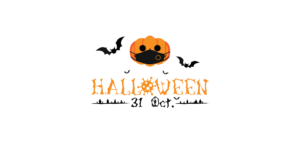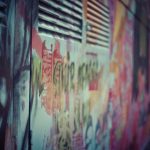The Offence of a Child Possessing Spray Paint Without a Lawful Purpose in NSW

Once just an American holiday that Australians would see on the big screen in movies like ET, Halloween has slowly, but steadily made its way to our shores.
And every year it just seems to get bigger here.
The shops have been full of decorations and paraphernalia for weeks, and now that Sydney, and most of New South Wales, are no longer under lockdown restrictions, it’s likely that many families are looking forward to participating on 31 October 2021, taking the opportunity to get together with the neighbours, have some fun and feel a sense of ‘normalcy’.
But what’s it going to be like to celebrate Halloween in the time of Covid? Well, it’s undoubtedly going to be an event that puts health and safety first.
Health advice
Families are being encouraged to check in with the NSW Health website to check on any restrictions in their local area.
These are likely to include using hand sanitiser and face covering, only handing out and accepting individually wrapped treats, keeping group and visiting sizes down, and exercising physical distancing.
Stay on the right side of the law!
Of course, children should always be supervised by a responsible adult who can oversee their personal safety.
Anyone driving should remember that Halloween tends to be a night that kids rule the streets, so drivers need to be wary, particularly at dusk when visibility is reduced.
Pedestrians should stick to footpaths and designated crossings, and also be aware of road safety.
Unfortunately, this is also a night where the kids can get out of control!
‘Sugar highs’, peer pressure and the false confidence provided by a superhero costume can lead to some kids and teens behaving badly – potentially even finding themselves on the wrong side of the law by engaging in activities like egging houses and cars, damaging plants and foliage, and other acts of vandalism and graffiti.
The offence of graffiti in New South Wales
Section 4 of the Graffiti Control Act 2008 (NSW), a person who marks a premises or property can face a penalty of up to 12 months in prison and/or a $2,200 fine if the prosecution is able to prove beyond reasonable doubt that:
- The marking was done intentionally,
- There was no consent from the owner of the premises or property that was marked on;, and
- Either:
- A graffiti implement was used for marking the premises or property. This includes, spray paint, maker pen, or anything designed to produce a mark that’s not readily removable by wiping it (or by use of water or detergent); or
- The marking was done in such a manner that it isn’t readily removable by wiping it (or by using water or detergent).
The offence of a child possessing spray paint in New South Wales
Section 8B of the Act makes it an offence for a person under the age of 18 years to possess spray paint in a public place. The maximum penalty for this offence is 6 months in prison and/or an $1,100 fine.
A ‘public place’ is defined as a place (whether or not covered by water), or a part of premises,
that is open to the public, or is used by the public whether or not on payment of money or other consideration, whether or not the place or part is ordinarily so open or used and whether or not the public to whom it is open consists only of a limited class of persons, but does not include the premises of a school or other educational establishment.
The defences to this particular offence are where:
(a) the spray paint was intended for a defined lawful purpose, being the lawful pursuit of an occupation, education or training, or
(b) the spray paint was for another defined lawful purpose and was at or in the immediate vicinity of the place where the spray paint can was being used or intended to be used for that defined lawful purpose.
The offence of intentionally or recklessly damaging property in New South Wales
Graffiti vandalism by way of marking surfaces can also result in criminal charges of intentionally or recklessly destroying or damaging property, which is an offence under section 195 of the Crimes Act 1900 (NSW) and comes with a maximum penalty of 5 years in prison.
Intentionally means wilfully or purposely, while recklessly means foreseeing the possibility of damage or destruction but proceeding regardless.
Courts have found that property is considered to have been damaged where:
- There is permanent damage,
- There is temporary functional derangement,
- There is temporary impairment of usefulness,
- The physical integrity of the property is altered, or
- The property is rendered imperfect or inoperative.
Some examples of conduct found by the courts to constitute damage include:
- Placing a blanket in a toilet and flushing,
- Letting down the tyres of a car,
- Painting graffiti on walls or floors, and
- Breaking a raw egg on the windscreen of a car.
The offence of trespassing in New South Wales
Trick or treaters should also be aware that not everyone participates in Halloween and for some it can be a real nuisance, and if you’re on someone’s property and they don’t want you there, you can also be charged with trespassing.
Trespassing – which is also known as entering inclosed lands without permission – is an offence under section 4 of the Inclosed Lands Protection Act 1901 (NSW), which makes it an offence to enter inclosed lands without permission which carries a maximum fine of $550.
Section 4A of the Act imposes steeper penalties for remaining on the premises after the owner or occupier directs you to leave. In such a case, the maximum fine is $2,200 where the land is a ‘prescribed premises’ such as a school, hospital, child care centre or nursing home, or $1,100 in all other cases.
Receive all of our articles weekly
Related Articles
RELATED LEGISLATION
- Section 4 Graffiti Control Act 2008 | Marking Premises or Property
- Section 8B Graffiti Control Act 2008 | Possessing Spray Cans by Under 18s
- Section 4A Inclosed Lands Protection Act 1901 | Offensive Conduct on Inclosed Lands
- Section 4 Inclosed Lands Protection Act 1901 | Unlawful Entry on Inclosed Lands
- Section 195 Crimes Act 1900 | Destroying or Damaging Property







